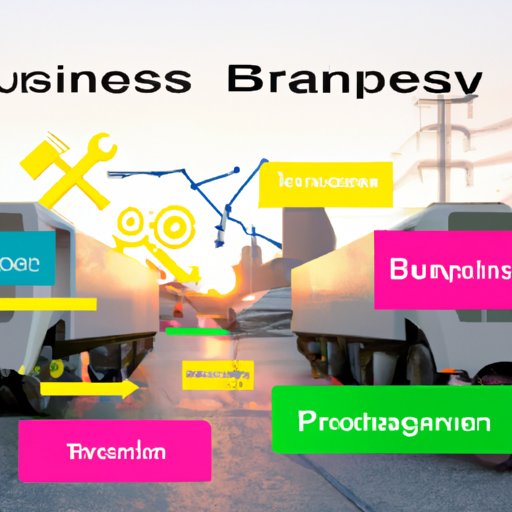Introduction
The transportation industry is a vital sector in any economy. It provides a crucial service for businesses, individuals, and organizations by enabling the movement of goods and people. As such, there is a need for reliable transportation services, which has created an opportunity for entrepreneurs to start their own businesses to meet this demand. Starting a transportation business requires research, strategic planning, and dedication to ensure its success.
Research the Transportation Industry
Before launching a transportation business, it is important to understand the legal and regulatory requirements that apply to the industry. Laws and regulations vary depending on the type of services you provide and the country or state in which you operate. It is essential to become familiar with the applicable rules and regulations and obtain the necessary permits and licenses before beginning operations. Additionally, it is important to analyze the competitive landscape to determine potential opportunities and challenges. Consider researching other transportation businesses in your area to identify their pricing structure, services offered, customer base, and marketing strategies.
Develop a Business Plan
Once you have a thorough understanding of the transportation industry, it is time to develop a business plan. The business plan should include a detailed description of the target market and services, as well as a financial plan outlining the costs associated with starting and operating the business. Additionally, create a marketing strategy to effectively reach your target audience. Consider utilizing both traditional and digital marketing tactics, such as radio and television advertisements, direct mail campaigns, and social media.
Secure Financing
In order to launch a transportation business, it is necessary to secure financing. Start by determining the amount of capital needed to startup and operate the business. Then explore different funding options, such as applying for a loan from a bank or seeking investors. Additionally, consider applying for government grants and subsidies that may be available to help finance your business.
Acquire Resources
Next, it is important to acquire the resources necessary to successfully operate the business. This includes obtaining vehicles, personnel, and materials. Additionally, invest in technology solutions that will enable efficient and cost-effective operations, such as GPS tracking systems, fleet management software, and digital booking systems.
Market Your Business
Once you have the resources necessary to operate the business, it is time to start marketing your services. Build an online presence by creating a website and social media accounts. Additionally, establish relationships with local businesses and utilize appropriate media outlets to promote your services. Utilize digital advertising platforms, such as Google Ads, to reach your target audience.
Offer Quality Services
To ensure customer satisfaction and loyalty, it is important to offer quality services. Make sure to follow safety regulations and adhere to the highest standards of professionalism. Additionally, focus on providing prompt and reliable services to ensure customer satisfaction. According to a survey conducted by the National Transportation Institute, “77% of customers stated that they would use the same transportation company again if they were pleased with their previous experience.”
Track Performance
It is essential to track the performance of your business to monitor progress and make changes to maximize efficiency and profitability. Utilize data-driven insights to identify areas of improvement and adjust your strategy accordingly. Additionally, evaluate customer feedback to assess satisfaction and make necessary changes.
Conclusion
Starting a transportation business can be a rewarding endeavor, but it requires significant research and planning. Before launching a business, it is important to understand the legal and regulatory requirements, analyze the competitive landscape, develop a business plan, secure financing, acquire resources, market your business, and offer quality services. Finally, track performance to monitor progress and make changes to maximize efficiency and profitability. With dedication and strategic planning, a transportation business can be successful and profitable.
(Note: Is this article not meeting your expectations? Do you have knowledge or insights to share? Unlock new opportunities and expand your reach by joining our authors team. Click Registration to join us and share your expertise with our readers.)
